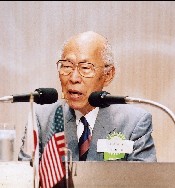��Giving consideration to education in Japan��
August 30, 2006
Mr. Akito Arima,
Chairman,
Japanese Science Foundation
 ��Reasons why the academic ability has become a topic of debate now in schools is because of a decrease in the number of children. It gets down to the fact that home education has become soft due to the low birthrate. Children do not encourage each other any more. Children are no longer disciplined by society. The true background of the problem is not academic ability, but social climate.
��Reasons why the academic ability has become a topic of debate now in schools is because of a decrease in the number of children. It gets down to the fact that home education has become soft due to the low birthrate. Children do not encourage each other any more. Children are no longer disciplined by society. The true background of the problem is not academic ability, but social climate.
��The purpose of the introduction of a five-day week school system was to allow children to exercise on Saturday, and to make parents discipline children staying by spending more time with them. Scholastic ability will improve if children build their physical strength and have a strong will.
��College teachers say the scholastic ability of students has fallen down. That is taken for granted. The population of people 18 years of age was two million and fifty thousand around 1992. For 1997-1998, this declined to one million and five hundred thousand. The college-going rate around 1970 was 20 percent. It is 45 percent now. If the rate of college admission increases, it is natural for academic ability to decline.
��What should be done to raise college students�� academic abilities to a level of 1990 or earlier? One idea is to halve the number of colleges or restore the faculty of arts that was broken down by each college around 1991 and 1992, and start afresh with such liberal arts education. Another idea is to restructure a sizable number of colleges to vocational colleges.
��Up until 1966, the Ministry of Education had conducted research on primary school students�� abilities once a year. Thereafter, however, it has done only once about every ten years on a small scale. It was 2001 when it conducted a nationwide survey again. It was a survey made immediately before new teaching guidelines were implemented. The Ministry conducted research in 2003 to see if academic ability had fell once again under the new education system. The results were released in 2004.
��As a result of analyzing correct answer rates, there was no subject for which the rate was lower than that of the previous survey, all the way through Japanese, social studies, arithmetic, mathematics, science and English.
��In 2001, in addition to an academic ability survey, research on children��s interest and concern was also conducted. Children in the fifth and six grades of primary school, and junior high school students were asked, ��Which subject do you like?�� The order of their likes slightly differs by grades, but their likes were generally in the order of science, Japanese, arithmetic (mathematics) and then social studies.
��The problem is the responses to a query of ��Do you like to study?�� The percentage of positive answers were 39.8, 33.8, 18.8, 16.0, and 17.8 respectively by fifth and sixth graders of primary school, and first, second and third grade students of junior high school. Only 16 percent of second grade junior high school students answered ��yes��. The biggest problem is that they have no strong will to study. In response to a question to junior high school students asking what their goal in life is, those who answered, ��to live a happy life from day to day�� accounted for 60 percent, the highest. Following them were students answered ��to enjoy one��s own hobbies�� and the percentage was 55 percent. Is it all right to let thirteen or fifteen-year-old children go like this?
��What has made this happen? This is because they have lost their physical energy. The Ministry of Education and Science got hold of the deterioration of children��s records in all categories of the 100-meter run, pull-up strength, throwing power, and the running broad jump. They have got to fully build up physical strength to begin with and then promote endurance. It is of a paramount importance to cultivate them so that they can have incentive to study, and set the aim to live a meaningful life.
��Academic abilities of Japanese children have never come down. Country-to-country comparison has not deteriorated either. There is no problem in primary and junior high schools. The general literacy of high school students is no good. They are weak in analyzing certain things and answering logically. I would like to urge teachers to educate and foster children from the stages of primary and junior high schools so that they can have the strength to think logically and express such thinking in writing.
��Children and teachers have lost their confidence, because children are told that they have no academic ability, and teachers are told that their teaching method is poor. Please encourage teachers. Please let children have their sense of mission. In Singapore, they reduced the content taught to children during a period of 10 to 15 years by 30 percent. They learned that teaching too much would result in weakening children��s thinking power, and therefore they reduced the material covered to foster their creativity, by which they succeeded in improving children��s academic achievement. I hope this would be informative.